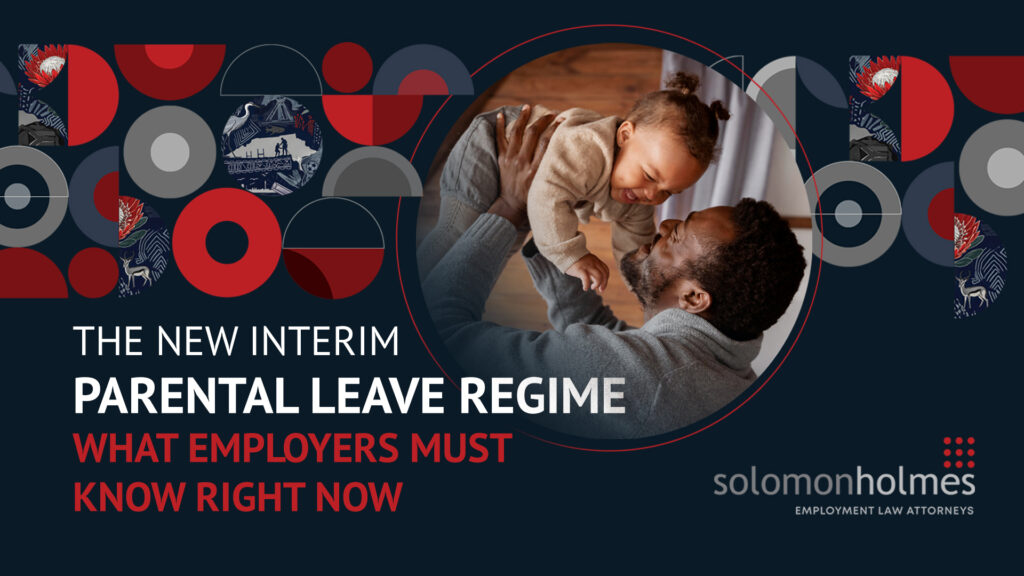We begin this two-part series on the recent Constitutional Court judgment that significantly alters South Africa’s parental leave landscape.
In Part I, we unpack the immediate legal changes, what they mean for employers today, and the steps employers should already be considering to ensure compliance with the new parental leave regime.
In Part II, we will delve deeper into the broader consequences, the challenges for both small and large businesses, and strategies to manage risk under the new order.
A landmark turn in Parental Leave in South Africa
In Van Wyk & Others v Minister of Employment and Labour, the Constitutional Court confirmed the High Court ruling handed down in October 2023, that certain provisions in the Basic Conditions of Employment Act (BCEA) and the corresponding benefits under the Unemployment Insurance Act (UIA) which govern maternity, parental, adoption and commissioning parental leave are constitutionally invalid in that they violate the, among others, the right to equality and dignity.
The Court has granted Parliament a period of 36 months to amend the relevant legislation. In the meantime, however, it has handed down an interim order with immediate effect, fundamentally reshaping the parental leave framework. Employers are therefore required to act without delay to, at a minimum:
- Review and amend employment contracts, policies, and procedures to ensure alignment with the provisions of the interim order (outlined below); and
- Engage with recognised trade union(s) where parental leave entitlements are regulated by collective agreements, with a view to negotiating revised agreements that reflect the new legal position on parental leave.
Basic Conditions of Employment Act paternity leave
The interim order has abolished the separate legal category of maternity leave (i.e., associated with birth mothers) under the BCEA and replaces it with a single, unified parental leave entitlement applicable to all qualifying parents. The key amendments introduced are as follows:
1. Total Parental Leave: 4 months + 10 days to be shared
Both parents are now entitled to a combined total of 4 months and 10 days’ parental leave. How they divide or share that leave is left to their discretion.
2. Fallback rule where parents cannot agree
If the two parents cannot agree on an apportionment, the leave must be divided as equally as possible between them.
Can parental leave be taken in parts
3. Flexibility in how parental leave is taken
Parents may take their entitlement concurrently, consecutively, or a mix of both. The law no longer rigidly prescribes how the leave must be allocated.
4. Preference for birthing mothers for recovery time
The judgment references that birth mothers should be prioritised for time to prepare for and recover from childbirth. This should therefore be the primary consideration when parents determine the manner in which leave is apportioned between them.
Government benefits for stay at home moms
5. Single or sole employed parent gets full entitlement
If only one parent is employed and, for example, the other parent is a ‘stay-at home’ parent, or if there is a single parent, that person is entitled to the full parental leave allocation.
6. Applicability across different forms of parenthood
The new Parental Leave entitlement further extends to:
- Parents via surrogacy agreements;
- Parents who adopt children younger than 2 years of age.
Notably, and contrary to the finding of the High Court, the Constitutional Court found that the old “cap” of two years for adoptive children was arbitrary and unconstitutional and has directed Parliament to revisit the appropriate age limit when drafting the permanent legislation. This particular provision remains unchanged in the interim.
How much maternity leave do men get
If employers already offered a more generous maternity and/or paternity leave benefit than the statutory minimum in terms of any company policies, employers must take immediate steps to ensure that these benefits are extended equally to all parents.
Concurrent parental leave
No immediate change to UIF benefits… for now
Importantly, the Court declined to issue an interim “reading-in” to adjust UIF benefit calculations, citing insufficient information. Thus, while the parental leave entitlement, as reflected above, is implemented with immediate effect, UIF payouts will continue in accordance with the existing provisions of the UIF Act until Parliament legislates the changes.
An important reflection
The Constitutional Court’s decision marks a pivotal moment in South Africa’s labour law landscape. By removing outdated distinctions and placing all parents on equal footing, the Court has reinforced the constitutional principles of dignity and equality in the workplace. That said, this new and largely untested terrain is likely to bring a range of unintended consequences, and employers would be well-advised to begin considering these now to proactively mitigate any potential risks and operational challenges. These are precisely the issues that will be unpacked in Part II of this series.
This development extends beyond a mere legal reform. It marks a cultural shift in how workplaces recognise and support parenthood. While Parliament works toward the necessary legislative amendments, employers should act now to ensure compliance, prevent discrimination, and reflect a genuine commitment to fairness and progressive workplace values.
If you require immediate advice or assistance with reviewing and updating your organisation’s policies, contracts, or internal procedures to ensure compliance with the Constitutional Court’s interim order, please do not hesitate to contact SolomonHolmes. Our Employment Law team is available to provide tailored guidance and practical support to help your business navigate these developments and implement the necessary changes with confidence and legal certainty.
Kathleen Holmes & Dylan Bouchier
SolomonHolmes Attorneys Inc.

